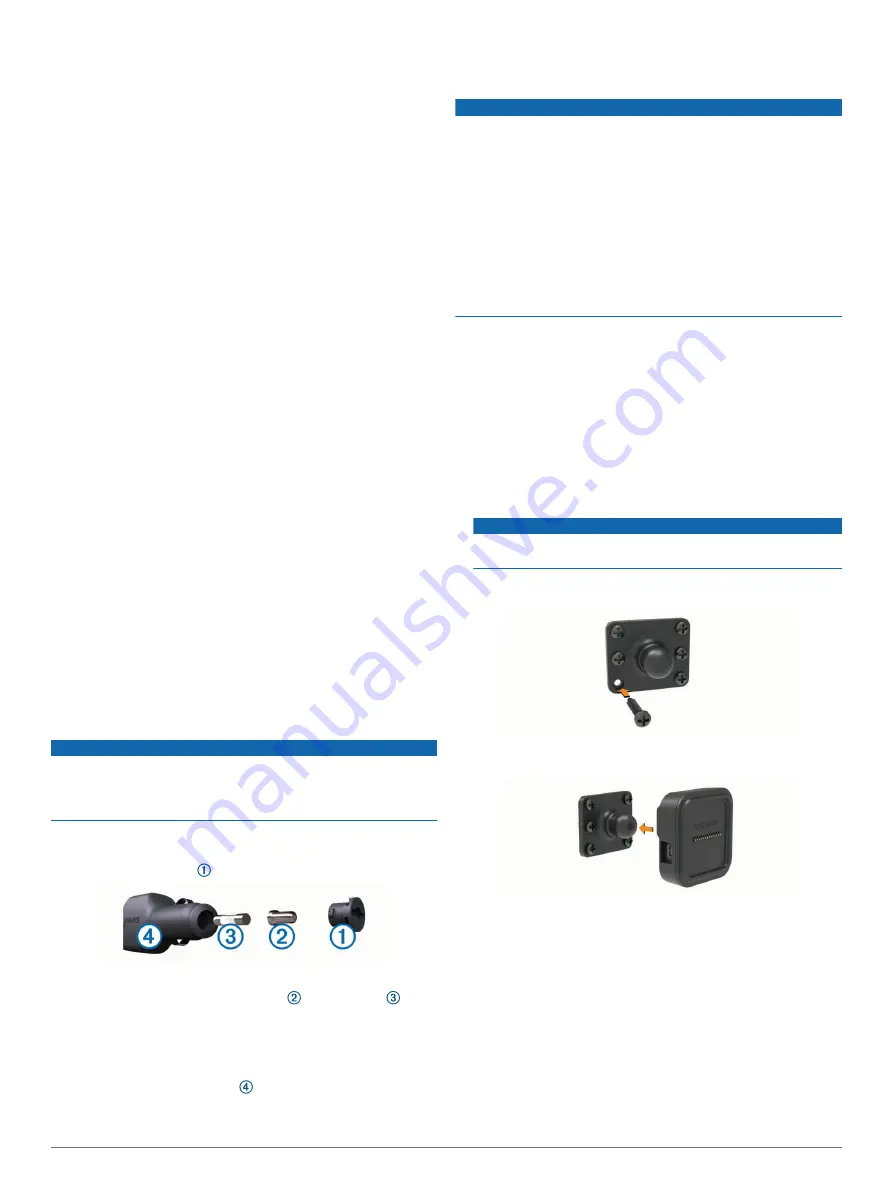
3
Select a file.
4
Select
Edit
>
Copy
.
5
Browse to a folder on the device.
NOTE:
For a removable drive or volume, you should not
place files in the Garmin folder.
6
Select
Edit
>
Paste
.
Disconnecting the USB Cable
If your device is connected to your computer as a removable
drive or volume, you must safely disconnect your device from
your computer to avoid data loss. If your device is connected to
your Windows computer as a portable device, it is not necessary
to safely disconnect the device.
1
Complete an action:
• For Windows computers, select the
Safely Remove
Hardware
icon in the system tray, and select your device.
• For Apple computers, select the device, and select
File
>
Eject
.
2
Disconnect the cable from your computer.
Power Cables
Your device can be powered various ways.
• Vehicle power cable
• USB cable
• AC adapter (optional accessory)
Charging the Device
NOTE:
This Class III product shall be powered by an LPS power
supply.
You can charge the battery in the device using any of these
methods.
• Install the device in the mount, and connect the mount to
vehicle power.
• Connect the device to an optional power adapter accessory,
such as a wall power adapter.
You can purchase an approved Garmin AC-DC adapter
suitable for home or office use from a Garmin dealer or
. The device may charge slowly when
connected to a third-party adapter.
Changing the Fuse in the Vehicle Power Cable
NOTICE
When replacing the fuse, do not lose any of the small pieces
and make sure they are put back in the proper position. The
vehicle power cable does not work unless it is assembled
correctly.
If your device does not charge in your vehicle, you may need to
replace the fuse located at the tip of the vehicle adapter.
1
Rotate the end piece counter clockwise to unlock it.
TIP:
You may need to use a coin to remove the end piece.
2
Remove the end piece, the silver tip , and the fuse .
3
Insert a new fast-blow fuse that has the same current, such
as 1 A or 2 A.
4
Place the silver tip in the end piece.
5
Push in the end piece and rotate it clockwise to lock it back
into the vehicle power cable .
Installing the RV Charging Station
Accessory
NOTICE
Failure to heed these installation requirements could result in
damage to the product or vehicle.
• You must choose a suitable mounting location for the
charging station before drilling holes in the vehicle wall.
• You must verify the mounting surface allows the mount to be
securely connected and the mounting screws will not
interfere with wiring or features in the wall.
• You must use proper mounting screws for your vehicle's wall
material. The included screws are intended for installation on
wood or fiberglass walls. Before installing the screws, you
must verify the screws are the correct length and will not
damage the exterior walls or any other components.
To install the RV charging station accessory, you need a Philips
screwdriver and a drill with a 1.5 mm (1/16 in.) drill bit.
The RV charging station accessory provides a permanent, wall-
mounted charging station for your device. This allows you to use
and charge the device in the living area of your RV.
1
Place the mount against the wall, and use the six screw holes
to mark the pilot-hole locations.
2
Remove the mount from the surface.
3
Using a 1.5 mm (1/16 in.) drill bit appropriate for the wall
material, drill a pilot hole in each of the six locations you
marked.
NOTICE
Do not drill through the mount. This could result in damage to
the mount or wall.
4
Line up the screw holes on the wall mount with the pilot
holes, and secure the mount to the wall using six screws.
5
Press the socket in the device mount onto the ball of the wall
mount until it snaps into place.
6
Route the bare-wire connectors to the RV battery or a 12 V
power source.
7
Connect the black wire to the negative (-) terminal of the
battery, and connect the red wire to the positive (+) terminal
of the battery.
Appendix
25




















